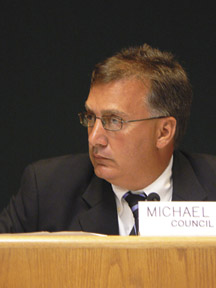In the weeks leading up to the recent mayor/council elections, the Independent candidates promised that, if elected, they would overhaul the town’s professional service contracts. They vowed to change the way these contracts are advertised and awarded and said they’d reduce the amount of money taxpayers have to shell out to pay for them.
With the inauguration just over a month away, Mayor-elect Michael Gonnelli and the other council Independents are beginning to map out how professional service contracts will be awarded next year.
“Obviously there are going to be a lot of changes, and obviously there are a lot of professional service contracts that are going to be done away with,” Gonnelli said last week.
“I’d like to see a minimum of at least three bids for each contract, and ideally have as many as eight.” – Michael Gonnelli
________
The money spent in March was $110,000 less than the amount of money the council spent on professionals in 2008, when 24 such contracts were approved. Despite the savings to taxpayers, Gonnelli and the other Independents on the council have long argued that Secaucus could save more money be doing some outsourced work in-house, and by soliciting competitive bids for contracts.
It is typical to award contracts to lawyers, accountants, auditors, lobbyists, and tax assessors. A single contract, even for a small town like Secaucus, can run hundreds of thousands of dollars. By outsourcing the work, a town can use the companies’ services only when needed and avoid the costs associated with full-time labor.
But critics believe that some outsourced work is unnecessary, some could be done by current municipal employees, and that too many contracts are awarded to politically connected donors and supporters. When those 23 contracts were awarded in March, many residents were also critical of the fact that many contracted services received only one or two bids, meaning there was very little competition for the work.
According to Town Administrator David Drumeler, Secaucus solicited bids from companies and awarded contracts based on the town’s past experience with each bidder, the bidders’ reputation, and the amount of the bid. Drumeler, who oversees the bidding process, has said that Secaucus solicits bids by advertising on the municipal Web site and on the New Jersey League of Municipalities Web site.
“We actually do more than we are legally required to do,” Drumeler said in March. “We’re only required to advertise on the municipal Web site. We go further and also advertise through the League of Municipalities because that’s where almost every company seeking government contracts looks for ads.”
The mayor-elect, however, believe these sites have generated too little response.
“Next year, we’re going to do much more advertising,” Gonnelli said. “I’d like to see a minimum of at least three bids for each contract, and ideally have as many as eight.”
“I think those are realistic numbers, “Drumeler said, “even though Secaucus is a small town. I think we’ll be able to get a lot of bids next year because there is a new administration. That’s when you’re more likely to see an increase in professional service bids, rather than when an administration has been in place for a while.”
To increase the number of bids, Gonnelli said the town will advertise for longer periods of time and go back to advertising in print publications. RFPs that generate only one or two bids, Gonnelli added, will be rebid.
In-sourcing
Next year, several jobs that were in the past done by professional service providers will almost certainly be done by current town employees, Gonnelli said, which will save taxpayers money.
Street sweeping, which until last month was done by Dependable Sweeping, will next year be done by employees with the Secaucus Department of Public Works. Grant writing and lobbying are two other areas that will see changes next year.
This year attorney Daniel Beck received a $24,000 contract to lobby on several issues on Secaucus’ behalf in Trenton.
“I think by working with Assemblyman [Vincent] Prieto, Assemblywoman [Joan] Quigley, and our state senators, and maybe even the town administrator we can get our issues across in Trenton without having to pay for it,” Gonnelli said.
Some things stay the same
Not every contract will be eliminated, however, and some service providers that have worked with the town in the past will continue to do so in the future.
The law firm of Weiner Lesniak, for instance, which works on tax appeals and land use issues for the town, could well see its contract renewed.,
“That’s work we still need done,” Gonnelli said. “And not everything can be done in-house. If Weiner Lesniak bids on the contract and they have a competitive bid, they could still be awarded the contract.”
E-mail E. Assata Wright at awright@hudsonreporter.com.
